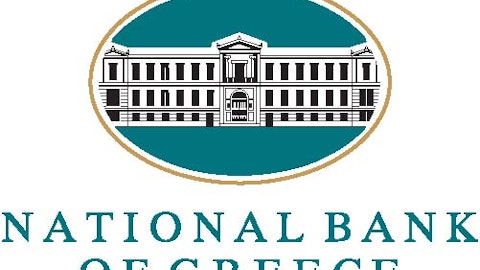Greece is known for a lot of things: the birthplace of democracy, a site of early intellectualism, and (in my opinion) some of the best food in the world. But today, Greece is also known for the financial crisis stemming from its unsustainable debt load. After receiving hundreds of billions of euros in bailouts from the European Central Bank, Greece is still in a recession but looks less likely to exit the eurozone than in previous years. With the possibility of a Greek economic recovery, contrarian investors may be interested in investing in this nation once again. And for this, we turn to National Bank of Greece (ADR) (NYSE:NBG).
Does it get much more contrarian?
When the words “Greece” and “Bank” are put together, most investors would run away as fast as they can–and so far this has proven to be a smart bet. A view of National Bank of Greece (ADR) (NYSE:NBG)’s 10 year stock chart is enough to make any investor cringe, with shares falling from a split-adjusted 2007 peak of over $600 per share to the $5.03 per share they closed at on June 10, 2013. The losses on this chart even beat out those of wounded American financials Bank of America Corp (NYSE:BAC), Citigroup Inc (NYSE:C), and even the bailout poster child American International Group Inc (NYSE:AIG). With losses like this, a fair share of both investor bravery and risk tolerance is required to get involved in an investment in National Bank of Greece (ADR) (NYSE:NBG).
Recapitalization
After being told to raise billions of additional euros in capital, National Bank of Greece (ADR) (NYSE:NBG) set about the process by launching a rights issue allowing current shareholders (but not ADR holders) to buy additional shares of the bank. In the end, the result has been massive share dilution and a 1 for 10 reverse stock split, giving the stock a new 52 week low. As part of National Bank of Greece (ADR) (NYSE:NBG)’s financial engineering, it is also making an offer to repurchase its NBG Preferred Shares for $12.50 per share, or half of their liquidation value. S&P has already said this to be a distressed purchase, but with NBG Preferreds rebounding off their low in the $2 range from around a year ago, buyers at the bottom already are sitting on multi-bagger returns.
But we have seen a similar story play out at another bank in another country that received an ECB bailout. Bank of Ireland (ADR) (NYSE:IRE) watched as investments in the Irish housing market blew up, putting huge holes in not only its own balance sheet but also in those of other banks making similar bets, including Allied Irish Banks and Anglo Irish Bank. Like National Bank of Greece (ADR) (NYSE:NBG), B of I underwent a recapitalization, massive share dilution, a rights issue, and a 1 for 10 reverse stock split. Shares of B of I are still nowhere near their pre-crisis heights, but have shown some life after the initial fall following the recapitalization. After languishing in the $5 to $6 per share range for several months following the recapitalization, shares have seen a strong gains briefly topping $10 per share before settling back into the $9 range.
Return to Greece?
Prior to the economic downturn, Greece was considered a reasonable place to invest. Even yields on Greek government bonds were barely higher than those of comparable German bonds at certain points. But the collapse showed Greece to be a very different place, and turned investing in Greece into market speculation. Following the recapitalization, National Bank of Greece (ADR) (NYSE:NBG) appears to be a more suitable investment now that the reverse split and share dilution stemming from the recapitalization are behind it. National Bank of Greece still looks to be in a downtrend, posting significant share price losses per day falling from the $7 range into the $5 range in a matter of weeks. Those looking to add National Bank of Greece to their portfolio may want to consider waiting for the share price to stabilize or building their position over time. In the end, National Bank of Greece is still a risky investment, but it carries less uncertainty than it did before the recapitalization was implemented.
The article Is It Time To Buy This Greek Bank? originally appeared on Fool.com and is written by Alexander MacLennan.
Alexander MacLennan has no position in any stocks mentioned. The Motley Fool has no position in any of the stocks mentioned. Alexander is a member of The Motley Fool Blog Network — entries represent the personal opinion of the blogger and are not formally edited.
Copyright © 1995 – 2013 The Motley Fool, LLC. All rights reserved. The Motley Fool has a disclosure policy.



